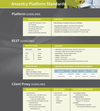Want Great APIs? Start With Training
When it comes to API development, consistency matters, training pays, and you can't be afraid of a few claws, says an Ancestry.com exec.

for our technical teams. What if one of your engineers is in a different time zone and can't always reach you? Our solution is a knowledge base called Ask/. It is very much like StackOverflow made by AnswerHub. It's very intuitive, and it now includes answers to hundreds of questions. Team members usually jump in and answer questions within minutes or hours. It's a great tool and knowledge repository, and it's a big help to remote teams.
Fourth, we developed a way to find our growing supply of documentation. Docu-what, you say? Yes, many teams have begun automating the deployment of their documentation to a central location. To help engineers find what they're looking for, we introduced AncestryDocs/ -- the hub for all things documentation. It includes these features.
Service listing: This resource provides a drilldown to each API by service.
"How to" docs: Many engineers don't know who to call or what service they should use. This "how-to" link gives them the information they need. It's particularly handy for remote engineers, but everyone has benefited.
Documentation template: This offers a quick way to create standardized documentation for your service.
Now that we have a Platform to support engineers and we have sent the word out, we can expect everything to immediately change, right? Not exactly.
Fifth, we needed a way to reinforce the importance of the Platform and to train our engineers. In other words, we needed to shift the culture and mindset of development. This is a big effort, and it doesn't happen overnight. We've employed the following strategies to bring about permanent change.
Newsletters: Sending out monthly newsletters has gotten the word out and has made the Platform relevant and top-of-mind.
New developer onboarding: Once a month, we hold an "onboarding" training course for new hires. This three-day training course covers many topics, including how to develop to the Platform.
API design training: No matter how diligent we are about getting the message out, it takes more than that to make the Platform permanent and part of the culture. To this end, we began giving API design training classes to individual teams. The goal was to make the topic very personal and hands on.
Posters: When training is over, each team gets a poster that summarizes Platform standards to hang in its area.

The Platform is a huge effort, but we believe it's worth it. Our newfound consistency and predictability in API interfaces saves time and money and makes our API consumers happier. And who knows -- it may even bring greater benefits to our engineers than a freshly bathed cat.
Can the trendy tech strategy of DevOps really bring peace between developers and IT operations -- and deliver faster, more reliable app creation and delivery? Also in the DevOps Challenge issue of InformationWeek: Execs charting digital business strategies can't afford to take Internet connectivity for granted.
About the Author
You May Also Like






